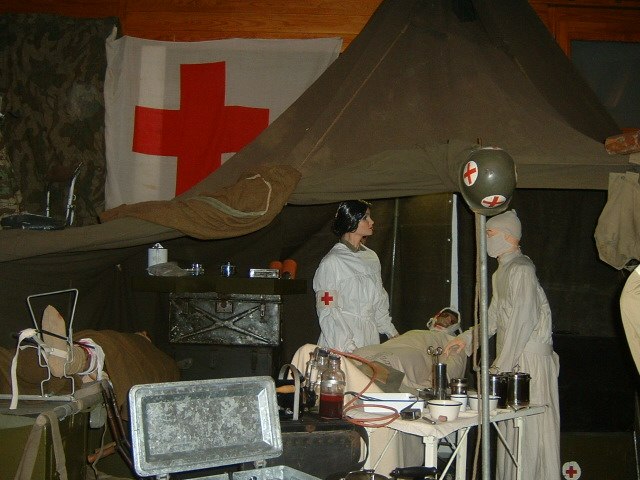United States Navy staff corps
In the United States Navy, commissioned officers are either line officers or staff corps officers. Staff corps officers are specialists in career fields that are professions unto themselves, such as physicians, lawyers, civil engineers, chaplains, and supply specialists. For example, a physician can advance to become the commanding officer (CO) of a hospital, the medical hospital on a hospital ship or large warship, or a medical school; or the Chief of the Medical Corps or of the Bureau of Medicine and Surgery. A supply officer can become the CO of a supply depot or a school, or the head of the Naval Supply Systems Command, etc.
Image: Darin K. Via (2)
Image: Guido F. Valdes (3)
Image: Walter D. Brafford (3)
Image: Robert J. Hawkins (2)
The term military medicine has a number of potential connotations. It may mean:A medical specialty, specifically a branch of occupational medicine attending to the medical risks and needs of soldiers, sailors and other service members. This disparate arena has historically involved the prevention and treatment of infectious diseases, and, in the 20th century, the ergonomics and health effects of operating military-specific machines and equipment such as submarines, tanks, helicopters and airplanes. Undersea and aviation medicine can be understood as subspecialties of military medicine, or in any case originated as such. Few countries certify or recognize "military medicine" as a formal speciality or subspeciality in its own right.
The planning and practice of the surgical management of mass battlefield casualties and the logistical and administrative considerations of establishing and operating combat support hospitals. This involves military medical hierarchies, especially the organization of structured medical command and administrative systems that interact with and support deployed combat units.
The administration and practice of health care for military service members and their dependents in non-deployed (peacetime) settings. This may consist of a medical system paralleling all the medical specialties and sub-specialties that exist in the civilian sector.
Medical research and development specifically bearing upon problems of military medical interest. Historically, this encompasses all of the medical advances emerging from medical research efforts directed at addressing the problems encountered by deployed military forces many of which ultimately prove important beyond the purely military considerations that inspired them.

French surgeon Ambroise Paré (c. 1510–1590) — known as the "Father of Military Medicine" — attending to a soldier's amputated leg.
Two French military surgeons treating wounded enemies after the battle of Inkermann, November 5, 1854.
WWII era field hospital re-created operating tent using puppets, Diekirch Military Museum, Luxembourg
A U.S. Combat Support Hospital (CSH), a type of mobile field hospital, used in war or disasters; successor to the Mobile Army Surgical Hospital (MASH)








